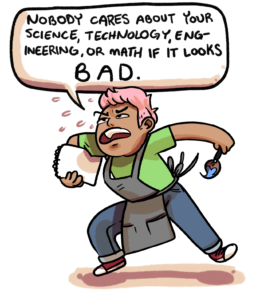Murray State will once again be separating the theatre and global language departments.
In 2017, the department of modern languages and the department of theatre arts merged due to low enrollment.
As the student population of language and theatre majors rose, more opportunities were being limited and taken from the students due to the combination of the departments. The University was excited to announce the separation, knowing the benefits coming their way.
Not only are numbers going back up, but the departments will finally be able to show the students the dedication they deserve.
This is a moment of joy for the arts and humanities; it’s not often they are growing their departments. Normally, the arts are crushed and shrunken down in favor of STEM programs.

STEM is quite the hot topic these days. Whether it’s women in STEM, what the latest technology is or what disease has just been cured, everyone talks science, technology, engineering and mathematics.
There’s no doubt that STEM is one of the most needed, but should the arts and humanities suffer for its benefit? So often, society seems to marginalize and even ignore the benefits of the arts.
STEM may give us the physical means to live, medicine, transportation, communication, but the arts and humanities keep us human. They let us look into the past and pave the road to our future.
Those who claim the arts and humanities are “worthless” often have degrees in those fields themselves. A good portion of politicians, especially Republicans, are guilty of spitting on the arts, and have degrees in fields like history or language.
Kentucky Gov. Matt Bevin has a degree in Asian Studies, and he has come out strongly in favor of cutting arts and humanities programs to grow STEM fields.
A big cause for the push for STEM is the obvious and already mentioned, economically and industrially, STEM does more for the world. It has a more obvious impact and therefore is raised to a higher pedestal – understandable, but not condonable.
This being said, some have suggested STEM should change to STEAM and include the arts. Arts, whether people admit it or not, are necessary for an individual to be truly well-rounded.
To have a full understanding of the way the world works, a person has to have at least a general knowledge of culture and history. The arts play into that in a major way.
A culture is defined by the language of its people, by the music they sing, the pictures they paint, the stories they tell. How can we as a society understand the science of a people if we do not even understand them fundamentally, their beliefs that they build themselves upon.
Some of the most well-known scientists, doctors, engineers and mathematicians in the world are artists and musicians. Many surgeons will also play instruments to keep their hands in a prime working condition.
It doesn’t stop there; there are plenty of other ways STEM depends on the arts and humanities. It only makes sense that we open STEM up to becoming STEAM. What about students who purely don’t like nor feel they belong in a STEM field? Should we consider them so much lower than another student just because their program doesn’t require as thorough an understanding of the cell structure?
The mitochondria is the powerhouse of the cell, what else is there to know?
I kid, but in all seriousness, both STEM and the arts and humanities depend on each other, whether they admit or not. They lean equally on each other for support, and benefit the world in different ways.